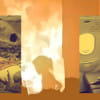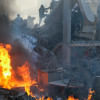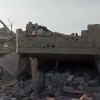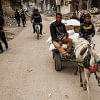Gaza boys turn to football to forget, for a moment, the war

Shouting and screaming with glee and frustration, Gazan boys kicked footballs around with their bare feet. It could have been almost anywhere in the world, but this was a sandy soccer field surrounded by tents in war-torn Gaza.
In Khan Yunis, a southern city of the coastal Palestinian territory, dozens turn up for practice as often as they can on the improvised pitch set up on the beach area of Al-Mawasi.
"For the two hours during which the boys come to train and play football, they forget about their fear, about the bombing and the war," said football coach Muayad Abu Afash, who launched the initiative to train children.
"Of course we're afraid," Khaled al-Akhras told AFP while his three sons ran across the field.
"But we got accustomed to keep on living our normal lives, even when shells are falling above our heads," the displaced father said.
Gaza has been ravaged by eight months of war triggered by the unprecedented October 7 attack on southern Israel by Palestinian militants from Hamas.
That attack resulted in the deaths of 1,194 people in Israel, mostly civilians, according to an AFP tally based on Israeli official figures.
Militants also took some 251 hostages, 120 of whom remain in Gaza, including 41 the army says are dead.
In Israel's retaliatory bombardment and ground offensive, at least 36,550 Palestinians, also mostly civilians, have been killed in Gaza, according to the health ministry in the Hamas-ruled Palestinian territory.
More than 1.7 million Palestinians have been displaced by the fighting and bombings, according to the United Nations agency for Palestinian refugees, also known as UNRWA.
Abu Afash himself had to leave Gaza City for Khan Yunis in the early days of the war, before fleeing further south and then returning north as he tried to escape Israeli military operations.
All sports infrastructure in the Gaza Strip has been damaged in air strikes, he said. "Stadiums have been destroyed," he added.
Soccer fever
Displaced children no longer go to school except for a few local initiatives providing some improvised schooling where the teaching is limited.
Non-government organisations frequently try to organise activities such as art workshops or clown and puppet shows, but the majority of young children spend their days idling on the streets.
"All this has a great impact on their psychological state as well as on their physical state," said coach Abu Afash, highlighting the importance of social interactions and physical activity for children.
For all players on the pitch, each and every game is already a small victory. Just a few weeks ago, Abu Afash was looking for a ball and a whistle.
"There aren't even any sports uniforms available, so the children come to practice barefoot," he said from the sidelines, which he fears may contain glass shards or other debris that could injure his future soccer champions.
Palestinians are football mad, all but guaranteeing that Abu Afash's training scheme would prove popular.
In late April, as the threat of a large-scale Israeli offensive loomed over Rafah, the far-southern city of Gaza where more than a million people had taken shelter, the love of the beautiful game was very much evident.
Dozens of young men gathered at a cafe to watch the Spanish league game between FC Barcelona and Real Madrid.
Standing in the enthralled crowd, Watan Ahmed, wearing a Torino Juventus jersey, described what it was like to be there.
"Look at these people, they are all exhausted, they all lost a member of their family or a relative," he told AFP.
"But we want to be happy, and the simple things in life make us happy."

 For all latest news, follow The Daily Star's Google News channel.
For all latest news, follow The Daily Star's Google News channel. 








Comments